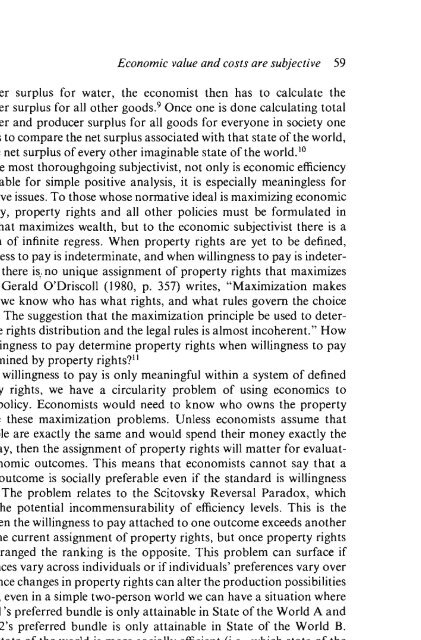Handbook on Contemporary Austrian Economics
Handbook on Contemporary Austrian Economics
Handbook on Contemporary Austrian Economics
Create successful ePaper yourself
Turn your PDF publications into a flip-book with our unique Google optimized e-Paper software.
Ec<strong>on</strong>omic value and costs are subjective 59<br />
c<strong>on</strong>sumer surplus for water, the ec<strong>on</strong>omist then has to calculate the<br />
c<strong>on</strong>sumer surplus for all other goods. 9 Once <strong>on</strong>e is d<strong>on</strong>e calculating total<br />
c<strong>on</strong>sumer and producer surplus for all goods for every<strong>on</strong>e in society <strong>on</strong>e<br />
then has to compare the net surplus associated with that state of the world,<br />
with the net surplus of every other imaginable state of the world.1O<br />
To the most thoroughgoing subjectivist, not <strong>on</strong>ly is ec<strong>on</strong>omic efficiency<br />
incalculable for simple positive analysis, it is especially meaningless for<br />
normative issues. To those whose normative ideal is maximizing ec<strong>on</strong>omic<br />
efficiency, property rights and all other policies must be formulated in<br />
a way that maximizes wealth, but to the ec<strong>on</strong>omic subjectivist there is a<br />
problem of infinite regress. When property rights are yet to be defined,<br />
willingness to pay is indeterminate, and when willingness to pay is indeterminate,<br />
there is; no unique assignment of property rights that maximizes<br />
wealth. Gerald O'Driscoll (1980, p. 357) writes, "Maximizati<strong>on</strong> makes<br />
sense if we know who has what rights, and what rules govern the choice<br />
process. The suggesti<strong>on</strong> that the maximizati<strong>on</strong> principle be used to determine<br />
the rights distributi<strong>on</strong> and the legal rules is almost incoherent." How<br />
can willingness to pay determine property rights when willingness to pay<br />
is determined by property rightsll<br />
Since willingness to pay is <strong>on</strong>ly meaningful within a system of defined<br />
property rights, we have a circularity problem of using ec<strong>on</strong>omics to<br />
render policy. Ec<strong>on</strong>omists would need to know who owns the property<br />
to solve these maximizati<strong>on</strong> problems. Unless ec<strong>on</strong>omists assume that<br />
all people are exactly the same and would spend their m<strong>on</strong>ey exactly the<br />
same way, then the assignment of property rights will matter for evaluating<br />
ec<strong>on</strong>omic outcomes. This means that ec<strong>on</strong>omists cannot say that a<br />
certain outcome is socially preferable even if the standard is willingness<br />
to pay. The problem relates to the Scitovsky Reversal Paradox, which<br />
shows the potential incommensurability of efficiency levels. This is the<br />
case when the willingness to pay attached to <strong>on</strong>e outcome exceeds another<br />
under the current assignment of property rights, but <strong>on</strong>ce property rights<br />
are rearranged the ranking is the opposite. This problem can surface if<br />
preferences vary across individuals or if individuals' preferences vary over<br />
time. Since changes in property rights can alter the producti<strong>on</strong> possibilities<br />
fr<strong>on</strong>tier, even in a simple two-pers<strong>on</strong> world we can have a situati<strong>on</strong> where<br />
Pers<strong>on</strong> I 's preferred bundle is <strong>on</strong>ly attainable in State of the World A and<br />
Pers<strong>on</strong> 2's preferred bundle is <strong>on</strong>ly attainable in State of the World B.<br />
Which state of the world is more socially efficient (i.e., which state of the<br />
world will have the most willingness to pay associated with it) The answer<br />
will depend <strong>on</strong> the distributi<strong>on</strong> of property rights. When the first pers<strong>on</strong><br />
is assigned a large porti<strong>on</strong> of the property rights, the net willingness to see<br />
State of the World A will be higher than to see State of the World B, but

















